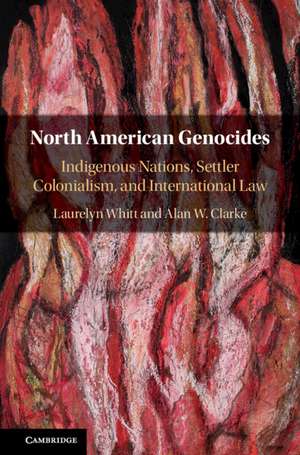North American Genocides: Indigenous Nations, Settler Colonialism, and International Law
Autor Laurelyn Whitt, Alan W. Clarkeen Limba Engleză Hardback – 31 iul 2019
| Toate formatele și edițiile | Preț | Express |
|---|---|---|
| Paperback (1) | 203.28 lei 6-8 săpt. | |
| Cambridge University Press – 25 mai 2022 | 203.28 lei 6-8 săpt. | |
| Hardback (1) | 723.92 lei 3-5 săpt. | |
| Cambridge University Press – 31 iul 2019 | 723.92 lei 3-5 săpt. |
Preț: 723.92 lei
Preț vechi: 841.77 lei
-14% Nou
Puncte Express: 1086
Preț estimativ în valută:
138.52€ • 145.02$ • 114.62£
138.52€ • 145.02$ • 114.62£
Carte disponibilă
Livrare economică 15-29 martie
Preluare comenzi: 021 569.72.76
Specificații
ISBN-13: 9781108425506
ISBN-10: 110842550X
Pagini: 262
Dimensiuni: 156 x 234 x 19 mm
Greutate: 0.5 kg
Editura: Cambridge University Press
Colecția Cambridge University Press
Locul publicării:New York, United States
ISBN-10: 110842550X
Pagini: 262
Dimensiuni: 156 x 234 x 19 mm
Greutate: 0.5 kg
Editura: Cambridge University Press
Colecția Cambridge University Press
Locul publicării:New York, United States
Cuprins
Introduction; 1. North American genocide denial; 2. The legal case for historical genocides: a retrospective methodology; 3. Settler colonialism and Indigenous nations; 4. A legal primer for settler colonial genocides; 5. The Beothuk (1500–1830); 6. The Powhatan Tsenacommacah (1607–1677); 7. The conventional account of genocide: from a restrictive to an expansive interpretation; 8. Toward an account of systemic genocide; Appendix A. Secretariat's draft convention; Appendix B. Ad hoc Committee Draft Convention; Appendix C. United Nations Convention on the Prevention and Punishment of Genocide; Index.
Recenzii
'For too long, the historical experience and lasting impact of settler colonialism on the indigenous peoples of the Americas has been neglected in international law scholarship. This thoughtful and provocative work helps bring this reality to the surface, particularly in respect of the controversial use of the term 'genocide' to describe colonial policies of physical and cultural destruction.' Payam Akhavan, McGill University, Montreal and former UN prosecutor
'This indispensable, remarkable and necessary book will change the way one comprehends the meaning of the crime of genocide in United Nations law. It is a brilliant and groundbreaking exposition that illuminates the predicament of the contested understanding of the crime of genocide and challenges the refusal to apply it to the destruction of North American Indigenous nations.' Sakej Henderson, Native Law Centre of Canada
'In 1946, two years before the UN Genocide Convention was adopted, the General Assembly recognized that 'many instances' of the crime of genocide had already taken place. This thoughtful and compelling account makes the case for one of them, the intentional destruction of indigenous peoples in North America.' William A. Schabas, Middlesex University
'This indispensable, remarkable and necessary book will change the way one comprehends the meaning of the crime of genocide in United Nations law. It is a brilliant and groundbreaking exposition that illuminates the predicament of the contested understanding of the crime of genocide and challenges the refusal to apply it to the destruction of North American Indigenous nations.' Sakej Henderson, Native Law Centre of Canada
'In 1946, two years before the UN Genocide Convention was adopted, the General Assembly recognized that 'many instances' of the crime of genocide had already taken place. This thoughtful and compelling account makes the case for one of them, the intentional destruction of indigenous peoples in North America.' William A. Schabas, Middlesex University
Notă biografică
Descriere
Argues that North American settler colonialism included episodes of genocide of Indigenous peoples as defined by the United Nations Genocide Convention.
